- Home
- Linda Lael Miller
McKettrick's Luck Page 2
McKettrick's Luck Read online
Page 2
They’d both turned serious.
These days Rance traveled the world, making deals for McKettrickCo.
“Smart-ass,” Keegan said, struggling not to grin.
“Buy you a beer?” Jesse asked, hopeful, for a brief moment, that his cousin was back.
Keegan glanced at his Rolex. “It’s my weekend with Devon,” he said. “I’m supposed to pick her up at six-thirty.”
Devon was Keegan’s nine-year-old daughter, and since he and his wife, Shelley, had divorced a year ago, they’d been shuttling the kid back and forth between Shelley and the boyfriend’s upscale condo in Flag and the main ranch house on the Triple M where Keegan remained.
Jesse hesitated, then laid a hand on Keegan’s shoulder. “It’s okay,” he said quietly. “Another time.”
Keegan sighed. “Another time,” he agreed, resigned. He started to walk away, then turned back. “And, Jesse?”
“What?”
The old, familiar grin spread across Keegan’s face. “Grow up, will you?”
“I’ll put that on my calendar,” Jesse promised, returning the grin. He loved Devon, whom he thought of as a niece rather than a cousin however many times removed, and certainly didn’t begrudge her time with Keegan. Just the same, he felt a twinge of sadness, too.
Everything and everybody in the world changed—except him.
That was the reality. Best accept it.
Jesse went back to the poker table and anted up for the next hand.
“CAN’T THIS WAIT UNTIL tomorrow?” Ayanna had asked, somewhat plaintively, after coffee at the kitchen table, where Mitch had sat brooding in his chair, when Cheyenne had announced her intention to track down Jesse McKettrick.
With a shake of her head, Cheyenne had said no, gathered her wits, smoothed her skirt and straightened her jacket, and made for the rental car.
McKettrickCo seemed to be the logical place to start her search—she’d already discovered, via her cell phone, that Jesse’s number was unlisted.
Cheyenne knew, having grown up in Indian Rock, that the company’s home offices were in San Antonio. The new building housed a branch of the operation, which meant the outfit was in expansion mode. According to her research, McKettrickCo was a diverse corporation, with interests in cutting-edge technology and global investment.
Jesse’s name wasn’t on the reader board in the sleekly contemporary reception area, a fact that didn’t surprise Cheyenne. When she’d known him, he was the original trust-fund bad boy, wild as a mustang and committed to one thing: having a good time.
She approached the desk, relieved that she didn’t recognize the woman tapping away at the keyboard of a supercomputer with three large flat-screen monitors.
“May I help you?” the receptionist asked pleasantly. She was middle-aged, with a warm smile, a lacquered blond hairdo and elegant posture.
Cheyenne introduced herself, hoping her last name wouldn’t ring any bells, and asked how to locate Jesse McKettrick. With luck—and she was due for some of that—she wouldn’t have to drive all the way out to his house and confront him on his own turf.
Not that any part of Indian Rock was neutral ground when it came to the McKettricks.
The receptionist assessed Cheyenne with mild interest. “Jesse could be anywhere,” she said, after some length, “but if I had to make a guess, I’d say he’s probably in the back room over at Lucky’s, playing poker.”
Cheyenne stiffened. Of course he’d be at Lucky’s—fate wouldn’t have it any other way. How many times, as a child, had she sneaked through the back door of that place from the alley and tried to will her father away from a game of five-card stud?
She produced a business card, bearing her name, affiliation with Meerland Real Estate Ventures, Ltd., and her cell number. “Thanks,” she said. “Just in case you see Mr. McKettrick before I do, will you give him my card and ask him to please call me as soon as possible?”
The woman studied Cheyenne’s information, frowned and then nodded politely. “He doesn’t come in too often,” she said.
Of course he didn’t.
Still Jesse, after all these years.
Cheyenne left McKettrickCo, got back into her car and drove resolutely to Lucky’s Main Street Bar and Grill. The gravel parking lot beside the old brick building was full, with the dinner hour fast approaching, so she parked in the alley, next to a mudsplattered black truck with both windows rolled down.
For a moment, she was a kid again, sent by her misguided mother to fetch Daddy home from the bar. She remembered propping her bike against the wall, next to the overflowing trash bin, rehearsing what she’d say once she got inside, forcing herself up the two unpainted steps and through the screened door, which always groaned on its hinges.
When the door suddenly creaked open, Cheyenne was startled. She wrenched herself out of the time warp and actually considered crouching behind the Dumpster until whoever it was had gone.
Jesse stepped out, stretched like a lazy tomcat at home in an alley and fixing to go on the prowl, and adjusted his cowboy hat. He wore old jeans, a Western shirt unbuttoned to his collarbone and the kind of boots country people called shit-kickers. Even mud and horse manure couldn’t disguise the fact that they were expensive, probably custom-made.
When Cheyenne’s gaze trailed back up to Jesse’s face, she realized that he was looking at her. Grinning that lethal grin.
She blushed.
Someone flipped the porch light on from inside, and moths immediately gravitated to it, out of nowhere. Drawing an immediate parallel between Jesse and the bulb, she took half a step back.
He registered her suit and high-heeled shoes in a lazy sweep of his eyes. He clearly didn’t recognize her, which was at once galling and a relief.
He tugged at the brim of his battered hat. “You lost?” he asked.
Cheyenne was a moment catching her breath. “No,” she answered, fishing in her hobo bag for another card. “My name is Cheyenne Bridges, and I was hoping to talk to you about a business proposition.”
She instantly regretted using the word proposition because it made a corner of Jesse’s mouth tilt with amusement, but she was past the point of no return.
He descended the steps with that loose-limbed, supremely confident walk she remembered so well and approached her. Put out his hand. “Jesse McKettrick,” he said.
There was nothing to say but “I know.” She’d given herself away with the first words she’d spoken.
“Bridges,” he said, reflecting. Studying the card pensively before slipping it into his shirt pocket.
Cheyenne braced herself inwardly. Glanced toward the screen door Jesse had come through a few moments before.
“Any relation to—?” He paused, stooped slightly to look into her face. Recollection dawned. “Wait a second. Cheyenne Bridges.” He grinned. “I remember you—Cash’s daughter. We went to the movies a couple of times.”
She swallowed, nodded, hiked her chin up a notch. “That’s right,” she said carefully. Cash’s daughter, that’s who she was to him. A shy teenager he’d dated twice and then lost interest in. He didn’t know, she reminded herself silently, that she’d tacked every picture of him she could get to the wall of her bedroom in that shack out beyond the railroad tracks, the way most girls did photos of rock stars and film idols. He didn’t know she’d loved him with the kind of desperate, hopeless adoration only a sixteen-year-old can feel.
He didn’t know she’d prayed that he’d fall madly in love with her. That she’d imagined their wedding, their honeymoon and the birth of their four children so often that sometimes it felt like a memory of something that had really happened, rather than the fantasy it was.
Thank God Jesse didn’t know any of those things. She wouldn’t have been able to face him if he had, even with Mitch and her mom and Nigel all depending on her to persuade him to sell five hundred unspoiled acres of land to her company.
“I heard about your brother’s accident,” he said. “I’m
sorry.”
Shaken out of her reverie, Cheyenne nodded again. “Thanks.”
“Your dad, too.”
Her eyes stung. She tried to speak, swallowed instead.
Jesse smiled, took a light grip on her elbow. “Do you always do business in alleys?” he teased.
For a moment, she was affronted. Then she realized it was a perfectly reasonable question. “No,” she said.
“I was just heading for the Roadhouse to grab some supper. Want to come along?” He gestured toward the muddy truck.
The Roadhouse, also known as the Roadkill Café, was an institution in Indian Rock, a haven for truck drivers, bikers, cowboys and state patrolmen. Ironically, families dined at Lucky’s, probably pretending that the card room behind it didn’t exist.
“I’ll meet you there,” Cheyenne said. She’d have been safe enough with Jesse, but no way was she climbing into that truck in a straight skirt. She had some dignity, after all, even if she did feel like the scrawny ten-year-old who’d parked her bike in this alley and gone inside to beg her father, with a stellar lack of success, to come home for supper. Or to watch her perform in the class play. Or to take Gram to the hospital because she couldn’t catch her breath…
“Okay,” Jesse said easily. He walked her to the rental car, which looked nondescript beside his truck. Like his boots, the vehicle had seen its share of action. Like his boots, it was top-of-the-line, with dual tires and an extended cab. Definitely leather seats, custom CD player and a GPS, too.
Once she was behind the wheel of the rental, with the window rolled down, Jesse leaned easily against the door and looked in at her.
“It’s good to see you again, Cheyenne,” he said.
“You, too,” she replied. But a lump rose in her throat. Don’t go there, she told herself sternly. This is business. You’ll buy the land. You’ll help Nigel get the construction project rolling. You’ll collect your bonus and take care of Mitch and your mother. And then you’ll go back to San Diego and forget Jesse McKettrick ever existed.
“As if,” she muttered aloud.
Jesse, in the process of turning away to head for his truck, turned back. “Did you say something?”
She gave him her best smile. “See you there,” she said.
He waved. Hoisted himself into the truck and fired up the engine.
Cheyenne waited until he pulled out, and then followed.
If she’d been as smart as other people thought she was, she thought grimly, she’d have kept on going. Sped right out of Indian Rock, past the Roadhouse, past Jesse and all the other memories and impossible dreams he represented, and never looked back.
CHAPTER TWO
JESSE REACHED the Roadhouse first and waited in his truck for Cheyenne to catch up. Things had been dull around Indian Rock lately, with nothing much to do besides play poker and feed horses, but he had a feeling life was about to get a little more interesting.
Smiling slightly, he pulled Cheyenne’s business card from his pocket and read it again. Meerland Real Estate Ventures, Ltd.
This time, it clicked.
The smile faded to black.
She wanted the land.
“Damn,” he muttered, watching in the side mirror as Cheyenne’s car turned into the lot and pulled up beside him.
He sighed. She’d been pretty, as a girl. Strangely alert, too, like a deer raising its head at a watering hole at the snap of a twig, sniffing the wind for the scent of danger. Now, as a woman, Cheyenne Bridges was beautiful. Slight in adolescence, she’d rounded out real well, and if she’d let that rich dark hair down from the prim French twist and ditch the librarian gear, she’d be a showstopper.
Jesse got out of the truck, waited stiffly while Cheyenne pushed open her car door to stand teetering on those ridiculous shoes. She smiled tentatively and touched her hair.
In poker, that move would be an eloquent tell: Cheyenne was nervous.
And if his suspicions were right, she had cause to be nervous. He retallied the facts in his head—she worked for a real-estate company, of the “ventures” variety, and back there in the alley behind Lucky’s she’d said she wanted to discuss a business proposition.
In those few moments while they both stood in the gap between silence and speech, between uncertainty and decision, he considered sparing her fruitless expectations. He wasn’t about to sell the acres just beyond the eastern boundaries of the Triple M, if that was what she wanted. That land was the only thing he’d ever gotten on his own and not by virtue of being born a McKettrick.
Then again, he supposed he ought to at least hear her out. Maybe he was wrong, and she was beating the brush for investors. Being a gambler, he might be able to get behind something like that, if only because it would mean spending time with Cheyenne, unraveling some of the mysteries.
One thing was obvious. Cheyenne had come a long way since she’d left Indian Rock. The car was nothing special—probably rented—but the clothes were upscale. And while she still used her maiden name, that didn’t mean she wasn’t married. His older sisters, Sarah and Victoria, both had husbands, but still they went by McKettrick.
He glanced at Cheyenne’s left hand, looking for a ring, but the hand was hidden by the wide strap of her purse.
“Shall we?” he asked and gestured toward the entrance of the Roadhouse.
She looked relieved. “Sure,” she said. She walked a little ahead, and he opened the door for her.
Jesse had been eating at the Roadhouse all his life, but as he followed Cheyenne over the threshold, it seemed strange to him, a place he’d never been before. The sounds and smells and colors spun around him, and he felt disoriented, as though he’d just leaped off some great wheel while it was still spinning. He was a second or two getting his bearings.
He’d gone to school with the hostess, from kindergarten through his senior year at Indian Rock High, but as he and Cheyenne followed the woman to a corner booth, he couldn’t have said what her name was.
What the hell was wrong with him?
Cheyenne slid into the red vinyl seat, and Jesse sat opposite, placing his hat on the wide windowsill behind the miniature jukebox. He ordered coffee, she asked for sparkling mineral water with a twist of lime.
They studied their plastic menus, and when the waitress showed up—Jesse had gone to school with her, too, and consulted her name tag so he wouldn’t be caught out—Cheyenne went with French onion soup and he chose a double-deluxe cheeseburger, with fries.
“Thanks, Roselle,” he said, to anchor himself in ordinary reality.
Roselle touched his shoulder, smiled flirtatiously and sashayed away to fill the orders.
Cheyenne raised her eyebrows slightly, but said nothing.
Might as well bite the bullet, Jesse figured. “So Cheyenne, what brings you back to Indian Rock after all this time?” he asked easily.
She took a sip of fizzy water. “Business,” she said.
Jesse thought of his land. Of the timber, and the wide, grassy clearings, and the creek that shone so brightly in the sun that it made a man blink. He tasted his coffee and waited.
Cheyenne sighed. She had the air of someone about to jump through an ice hole in a frozen lake. “My company is prepared to offer you a very competitive price for—”
“No,” Jesse broke in flatly.
She’d made the jump, and from her expression, the water was even colder than expected. “No?”
“No,” he repeated.
“You didn’t let me finish,” she protested, rallying. “We’re talking about several million dollars here. No carrying back a mortgage. No balloon payments. Cash. We can close on the deal within two weeks of going to contract.”
Jesse started to reach for his hat, sighed and withdrew his hand. He’d seen this coming. Why did he feel like a kid who’d counted on getting a BB gun for Christmas and found new underwear under the tree instead?
“There isn’t going to be any contract,” he said.
She paled. Settled back
against the booth seat. Her hand trembled as she set down her water glass.
“The price is negotiable,” she told him after a few moments of looking stricken.
He knew what she was thinking; he could read it in her face. Money talks. She thought he was angling for a higher price.
“You should never take up poker,” he said.
The food arrived.
Roselle winked as she set the burger down in front of him.
“I hate women like that,” Cheyenne told him after Roselle had swivel-hipped it back behind the counter.
Unprepared for this bend in the conversational river, Jesse paused with a French fry halfway to his mouth. “What?”
“They’re a type,” Cheyenne said, leaning in a little and lowering her voice. “Other women are invisible to them. If they had their way, the whole world would be a reverse harem.”
Jesse chuckled. “Well, that’s an interesting take on the subject,” he allowed. “The soup’s pretty good here.”
She picked up her spoon, put it down again. “It’s not as if I’m asking you to sell any part of the Triple M,” she said. Another hairpin turn, but this time, Jesse was ready. “That land is just sitting there. Unused.”
“Unspoiled,” Jesse clarified. “I suppose you want to turn it into an industrial park. Or a factory—the world really needs more disposable plastic objects.”
“Condominiums,” Cheyenne said, squaring her shoulders.
Jesse winced. “Even worse,” he replied.
“People need places to live.”
“So do critters,” Jesse said. He’d been hungry when he’d suggested supper at the Roadhouse. Now, he wasn’t sure he could choke down any part of that cheeseburger. “We’ve got so many coyotes and bobcats coming right into town these days that the feds are about to put a bounty on them. Do you know why, Ms. Bridges?” he asked, suddenly icily formal.

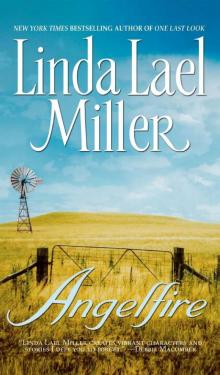 Angelfire
Angelfire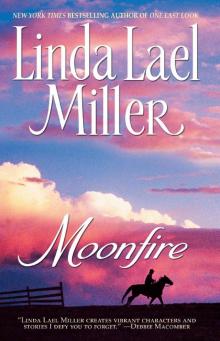 Moonfire
Moonfire The Yankee Widow
The Yankee Widow The Cowboy Way
The Cowboy Way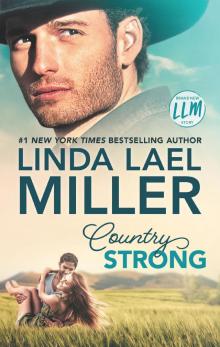 Country Strong--A Novel
Country Strong--A Novel Forever and a Day
Forever and a Day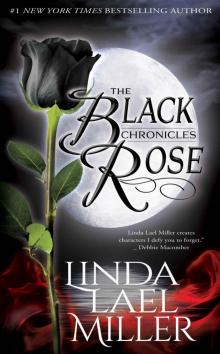 The Black Rose Chronicles
The Black Rose Chronicles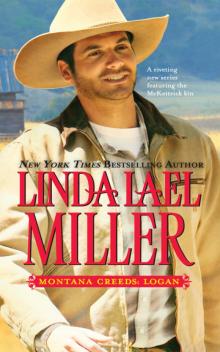 Montana Creeds: Logan
Montana Creeds: Logan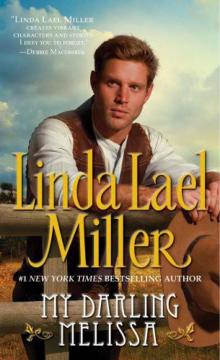 My Darling Melissa
My Darling Melissa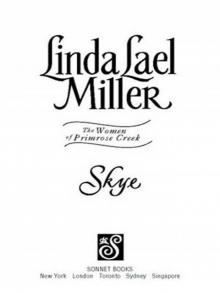 Skye
Skye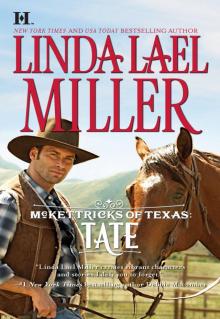 McKettricks of Texas: Tate
McKettricks of Texas: Tate Springwater Seasons
Springwater Seasons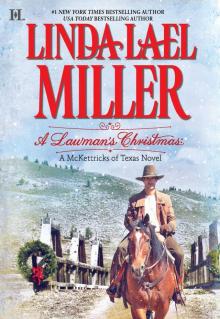 A Lawman's Christmas
A Lawman's Christmas Sierra's Homecoming
Sierra's Homecoming![Parable, Montana [4] Big Sky Summer Read online](http://i1.bookreadfree.com/i/03/22/parable_montana_4_big_sky_summer_preview.jpg) Parable, Montana [4] Big Sky Summer
Parable, Montana [4] Big Sky Summer One Last Weekend
One Last Weekend A Stone Creek Collection, Volume 2
A Stone Creek Collection, Volume 2 Tonight and Always
Tonight and Always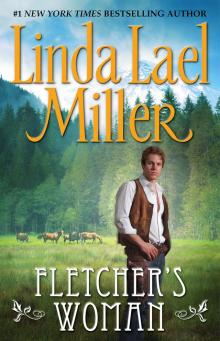 Fletcher's Woman
Fletcher's Woman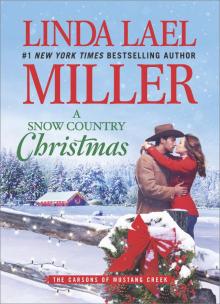 A Snow Country Christmas
A Snow Country Christmas The Last Chance Cafe
The Last Chance Cafe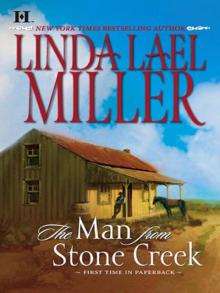 The Man from Stone Creek
The Man from Stone Creek Wanton Angel
Wanton Angel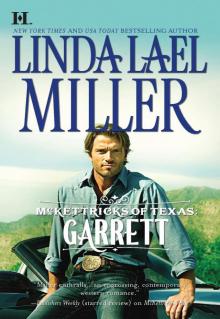 McKettricks of Texas: Garrett
McKettricks of Texas: Garrett Memory's Embrace
Memory's Embrace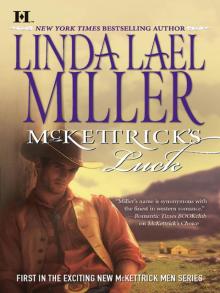 McKettrick's Luck
McKettrick's Luck Pirates
Pirates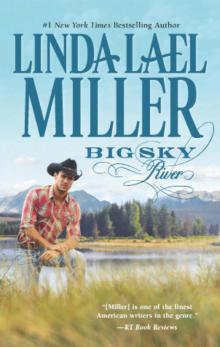 Big Sky River
Big Sky River Willow: A Novel (No Series)
Willow: A Novel (No Series)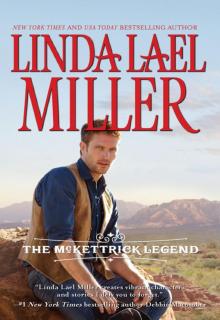 The McKettrick Legend: Sierra's HomecomingThe McKettrick Way (Hqn)
The McKettrick Legend: Sierra's HomecomingThe McKettrick Way (Hqn) Glory, Glory: Snowbound with the Bodyguard
Glory, Glory: Snowbound with the Bodyguard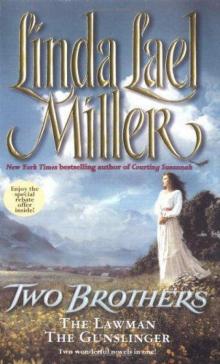 Two Brothers
Two Brothers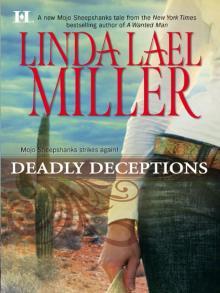 Deadly Deceptions
Deadly Deceptions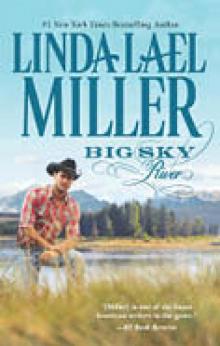 Big Sky Secrets
Big Sky Secrets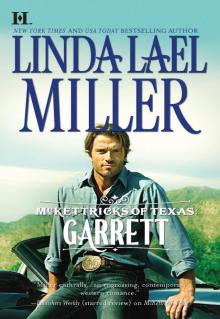 Garrett
Garrett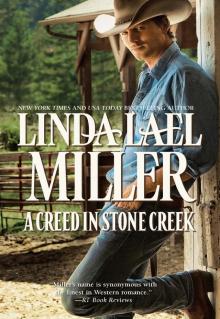 A Creed in Stone Creek
A Creed in Stone Creek Megan
Megan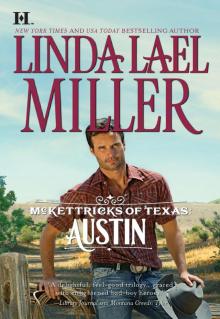 McKettricks of Texas: Austin
McKettricks of Texas: Austin Knights
Knights High Country Bride
High Country Bride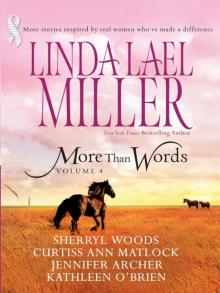 More Than Words Volume 4
More Than Words Volume 4 Glory, Glory
Glory, Glory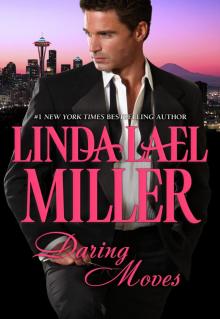 Daring Moves
Daring Moves Lily and the Major
Lily and the Major Courting Susannah
Courting Susannah Banner O'Brien
Banner O'Brien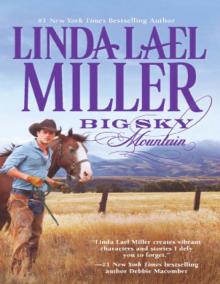 Big Sky Mountain
Big Sky Mountain Linda Lael Miller Bundle
Linda Lael Miller Bundle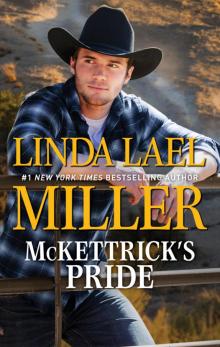 McKettrick's Pride
McKettrick's Pride A Stone Creek Collection Volume 1
A Stone Creek Collection Volume 1 A Wanted Man
A Wanted Man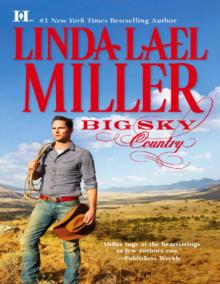 Big Sky Country
Big Sky Country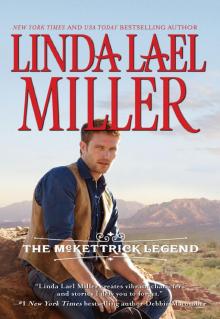 The McKettrick Legend
The McKettrick Legend Christy
Christy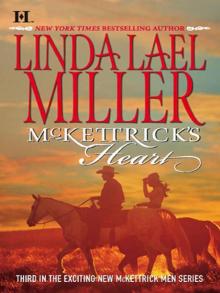 McKettrick's Heart
McKettrick's Heart Resurrection
Resurrection Arizona Heat
Arizona Heat Secondhand Bride
Secondhand Bride Snowflakes on the Sea
Snowflakes on the Sea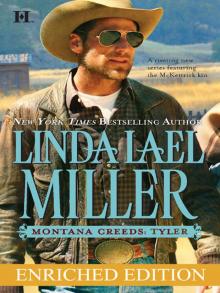 Montana Creeds: Tyler
Montana Creeds: Tyler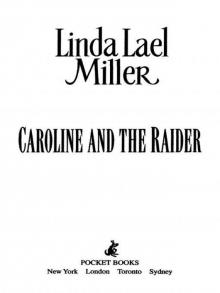 CAROLINE AND THE RAIDER
CAROLINE AND THE RAIDER A Proposal for Christmas: State SecretsThe Five Days of Christmas
A Proposal for Christmas: State SecretsThe Five Days of Christmas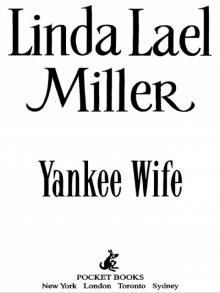 Yankee Wife
Yankee Wife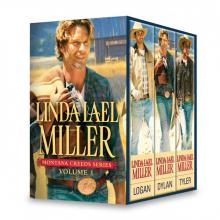 Linda Lael Miller Montana Creeds Series Volume 1: Montana Creeds: LoganMontana Creeds: DylanMontana Creeds: Tyler
Linda Lael Miller Montana Creeds Series Volume 1: Montana Creeds: LoganMontana Creeds: DylanMontana Creeds: Tyler The Christmas Brides
The Christmas Brides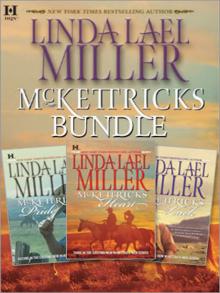 McKettricks Bundle
McKettricks Bundle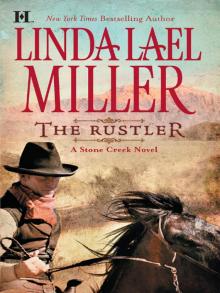 The Rustler
The Rustler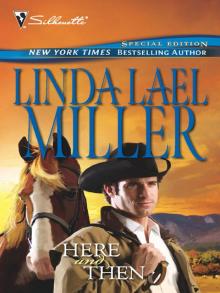 Here and Then
Here and Then Only Forever
Only Forever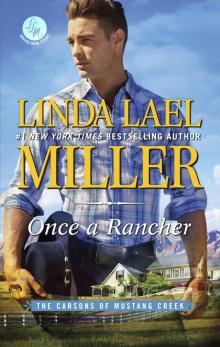 Once a Rancher
Once a Rancher The 24 Days of Christmas
The 24 Days of Christmas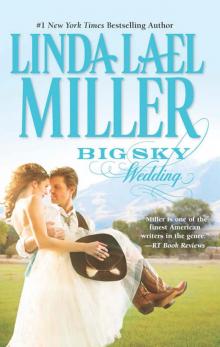 Big Sky Wedding
Big Sky Wedding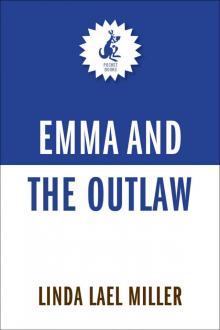 Emma and the Outlaw
Emma and the Outlaw Princess Annie
Princess Annie Wild About Harry
Wild About Harry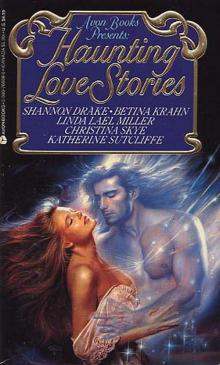 That Other Katherine
That Other Katherine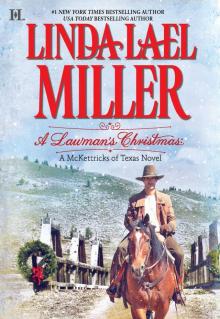 A Lawman's Christmas: A McKettricks of Texas Novel
A Lawman's Christmas: A McKettricks of Texas Novel Just Kate: His Only Wife (Bestselling Author Collection)
Just Kate: His Only Wife (Bestselling Author Collection)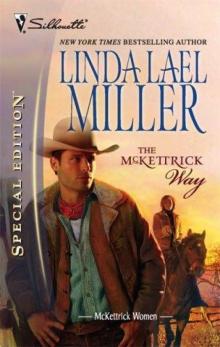 The McKettrick Way
The McKettrick Way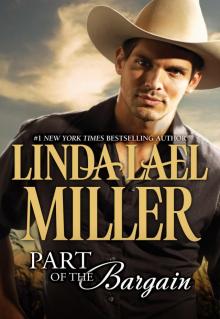 Part of the Bargain
Part of the Bargain Taming Charlotte
Taming Charlotte Holiday in Stone Creek
Holiday in Stone Creek One Last Look
One Last Look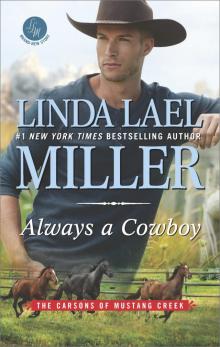 Always a Cowboy
Always a Cowboy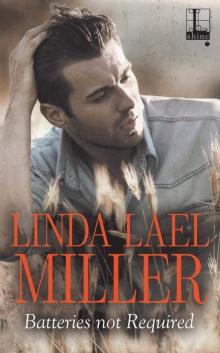 Batteries Not Required
Batteries Not Required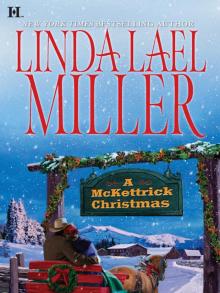 A McKettrick Christmas
A McKettrick Christmas For All Eternity
For All Eternity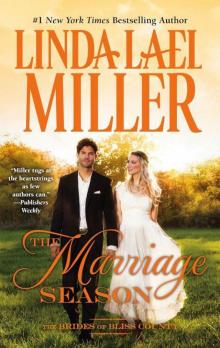 The Marriage Season
The Marriage Season Corbin's Fancy
Corbin's Fancy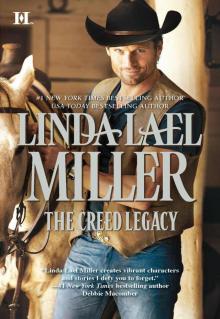 The Creed Legacy
The Creed Legacy Springwater Wedding
Springwater Wedding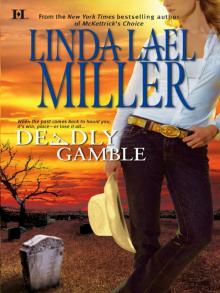 Deadly Gamble
Deadly Gamble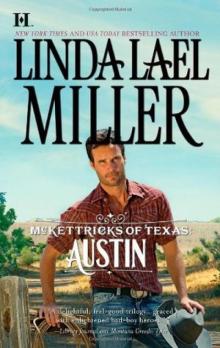 Austin
Austin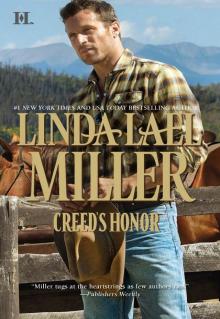 Creed's Honor
Creed's Honor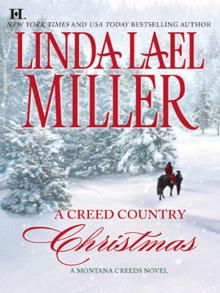 A Creed Country Christmas
A Creed Country Christmas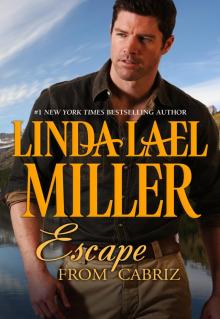 Escape from Cabriz
Escape from Cabriz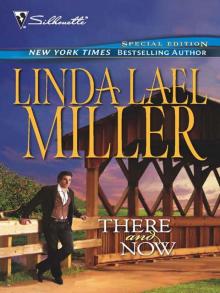 There and Now
There and Now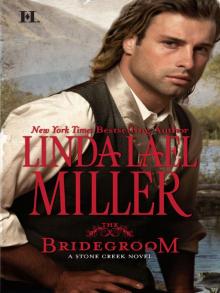 The Bridegroom
The Bridegroom State Secrets
State Secrets Bridget
Bridget